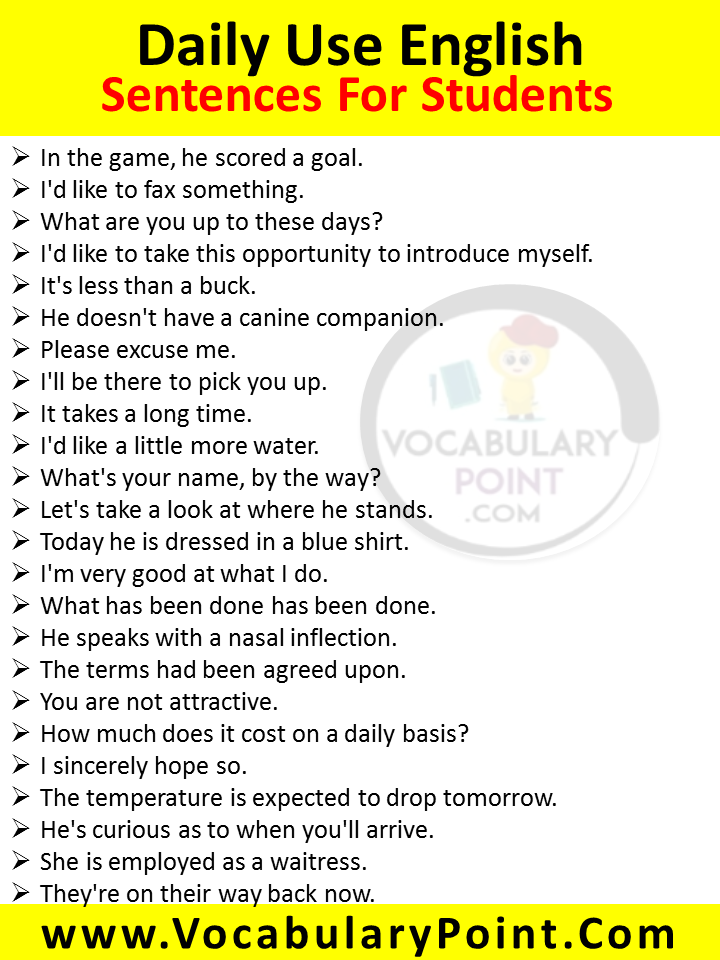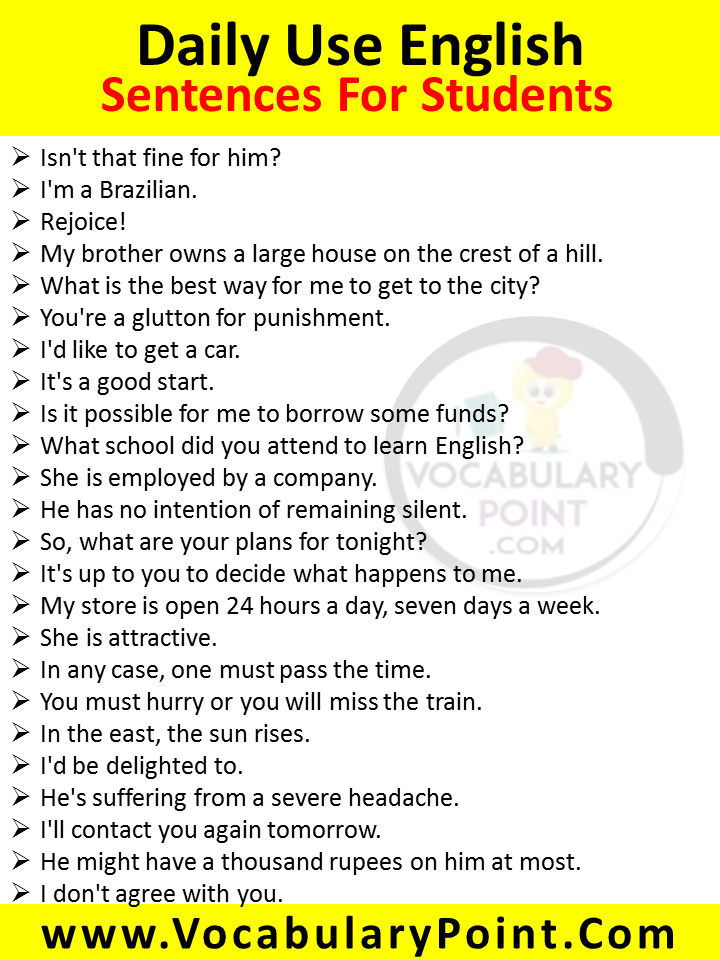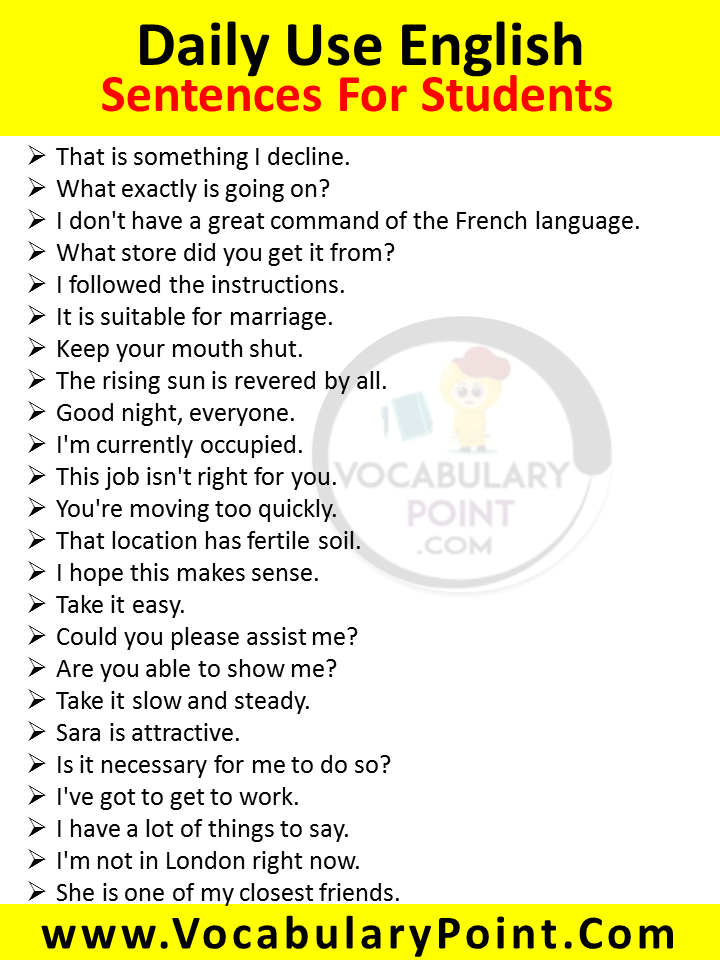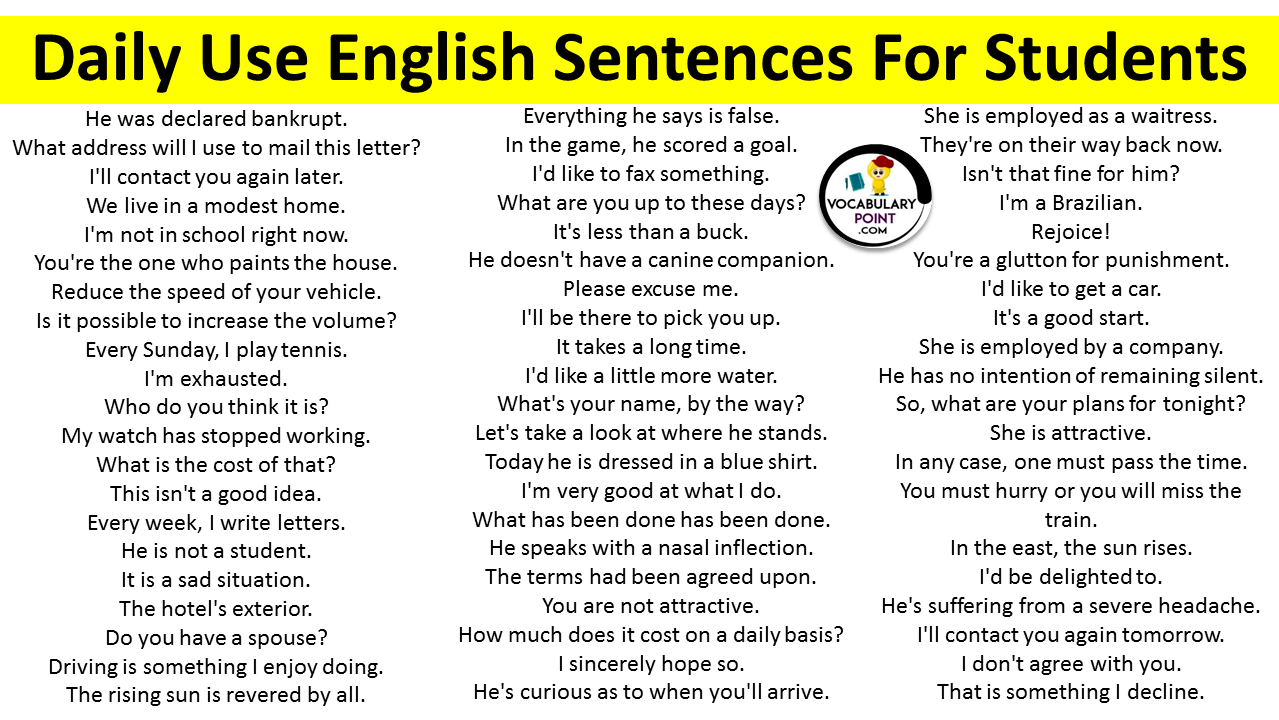Every day, we use many simple Daily use English Sentences for Students that help us communicate with others. Whether it’s asking for something politely, sharing our thoughts, or just greeting someone, these sentences are very important. This blog post will explore some common sentences that you can use daily. These will help you talk more confidently and make your conversations easier. Let’s start learning these handy sentences so you can use them in school, at home, or while playing with friends!
Daily use of English Sentences for Students
- What’s your name? – Identify yourself, please.
- How are you? – Inquire health, wellbeing.
- I don’t know. – Lack of knowledge.
- Can you help? – Request for assistance.
- Where is bathroom? – Ask for restroom.
- I need water. – Requesting a drink.
- Excuse me, please. – Politely getting attention.
- Thank you. – Express gratitude.
- You’re welcome. – Respond to thanks.
- I’m sorry. – Apologize, express regret.
- Can I go? – Permission to leave.
- Is this yours? – Confirm ownership.
- What time is it? – Inquire about hour.
- Please sit down. – Invite to seat.
- Could you repeat? – Request repetition.
- Please speak slowly. – Request slower speech.
- What does this mean? – Ask for explanation.
- How do you spell that? – Inquire about spelling.
- I don’t understand. – Confusion, lack of clarity.
- Please write it down. – Request written note.
- Could you explain? – Seek clarification.
- Where are we meeting? – Ask meeting place.
- What’s for lunch? – Inquire about meal.
- Do you have a pen? – Request for pen.
- Please call me. – Request a call.
- I’m lost. – Admitting disorientation.
- Can I try? – Request attempt.
- Please be quiet. – Request silence.
- Let’s work together. – Propose collaboration.
- Turn off the light. – Request to extinguish.
- Please open the door. – Request entry.
- I’m hungry. – Express hunger.
- Do your homework. – Instruct study tasks.
- Let’s go home. – Suggest returning.
- Take your time. – No rush implied.
- Keep it up. – Encourage continuation.
- Try your best. – Encourage full effort.
- Follow the rules. – Adhere to guidelines.
- Speak up, please. – Request louder speech.
- I appreciate it. – Express gratitude.
- Are you sure? – Confirm certainty.
- Watch your step. – Warn of danger.
- Mind your business. – Advise focus on self.
- What’s the matter? – Inquire about problem.
- It doesn’t matter. – Minimize importance.
- Take care! – Wish well-being.
- Hurry up! – Request faster action.
- It’s too early. – Premature timing noted.
- It’s too late. – Delayed timing noted.
- What’s happening? – Ask for update.
- Please stop that. – Request cessation.
- I’ll think about it. – Ponder decision.
- May I leave? – Request permission exit.
- I agree. – Express agreement.
- I disagree. – Express disagreement.
- That sounds great. – Positive reaction.
- I’m not sure. – Uncertainty expressed.
- Please explain more. – Request detailed explanation.
- That’s correct. – Confirm accuracy.
- That’s incorrect. – Correct an error.
- Let’s discuss it. – Propose conversation.
- Please go ahead. – Give permission proceed.
- You did well. – Praise performance.
- I’m very busy. – Express busyness.
- Please wait outside. – Ask to wait.
- Can we talk? – Request discussion.
- Please hurry back. – Quick return requested.
- What should I do? – Seek guidance.
- It’s not fair. – Justice questioned.
- It’s on me. – Offer to pay.
- Keep the change. – Gift excess payment.
- I’m feeling sick. – Illness reported.
- Let’s settle this. – Resolve issue.
- Can you hear me? – Audio check inquiry.
- I’ll handle it. – Take responsibility.
- That’s very kind. – Appreciate generosity.
- Please pass that. – Request object passed.
- Are we ready? – Check preparedness.
- I’m not ready. – Unprepared state.
- What’s your opinion? – Ask for view.
- Please keep moving. – Encourage progress.
- I’ll call you. – Promise to contact.
- Who’s there? – Inquire presence.
- Let’s take a break. – Propose pause.
- Don’t worry. – Reassure, calm.
- What went wrong? – Inquire issue cause.
- We missed you. – Express missed presence.
- Are you busy? – Inquire availability.
- What’s your favorite? – Ask preferred choice.
- Can you fix this? – Request repair.
- I didn’t mean that. – Clarify misunderstanding.
- Let’s meet tomorrow. – Propose future meeting.
- I need advice. – Seek guidance.
- That’s too bad. – Express sympathy.
- You’re doing great. – Positive encouragement.
- It’s up to you. – Your decision.
- You made my day. – Express happiness.
- How was school? – Inquire about education.
- Did you hear? – Ask if informed.
- See you tomorrow. – Farewell till tomorrow.
- Good job! – Praise good work.
- I love it! – Express strong like.
- It’s not working. – Function failure noted.
- It’s really important. – Stress significance.
- That’s not right. – Incorrect assertion.
- I need space. – Request personal area.
- Watch the time. – Monitor time closely.
- Let’s get started. – Begin activity.
- You look great. – Compliment appearance.
- What’s the plan? – Inquire about strategy.
- Do you mind? – Request permission, politely.
- It makes sense. – Logically sound.
- I miss you. – Express longing.
- It’s worth it. – Value asserted.
- Take it easy. – Relax, don’t rush.
- I forgot. – Admit memory lapse.
- How much is this? – Inquire price.
- I’m on my way. – En route notification.
- I’ll be late. – Delay notification.
- I can’t decide. – Indecision expressed.
- You surprised me. – Unexpected act noted.
- It’s your turn. – Prompt action.
- That’s a deal. – Agreement confirmed.
- Save your work. – Instruct data preservation.
- What’s your address? – Ask for location.
- You’re kidding, right? – Express disbelief.
- Are you coming? – Confirm attendance.
- Close the door. – Request door shut.
- Turn it off. – Stop operation.
- Turn it on. – Start operation.
- Are you okay? – Check well-being.
- I think so. – Affirmative with uncertainty.
- What’s that sound? – Inquire noise source.
- Are you lost? – Question orientation.
- Just a moment. – Request brief wait.
- Hold on tight. – Advise secure grip.
- What’s this for? – Question purpose.
- I’m proud of you. – Express admiration.
- That makes two. – Agree, second person.
- Where should we eat? – Inquire dining place.
- You’re early today. – Note early arrival.
- Don’t give up. – Encourage perseverance.
- It’s around here. – Nearby location noted.
- Can I help? – Offer assistance.
- I’ll see you. – Promise future meeting.
- That’s all right. – Express acceptance.
- Keep in touch. – Maintain communication.
- I’ll check it. – Promise to verify.
- That’s a good one. – Acknowledge clever remark.
- I’ve had enough. – State completion, saturation.
Explore More:

Daily use Sentences in the classroom for Students
- Everything he says is false.
- In the game, he scored a goal.
- I’d like to fax something.
- What are you up to these days?
- I’d like to take this opportunity to introduce myself.
- It’s less than a buck.
- He doesn’t have a canine companion.
- Please excuse me.
- I’ll be there to pick you up.
- It takes a long time.
- I’d like a little more water.
- What’s your name, by the way?
- Let’s take a look at where he stands.
- Today he is dressed in a blue shirt.
- I’m very good at what I do.
- What has been done has been done.
- He speaks with a nasal inflection.
- The terms had been agreed upon.
- You are not attractive.
- How much does it cost on a daily basis?
- I sincerely hope so.
- The temperature is expected to drop tomorrow.
- He’s curious as to when you’ll arrive.
- She is employed as a waitress.




Thank you so Much
Very important